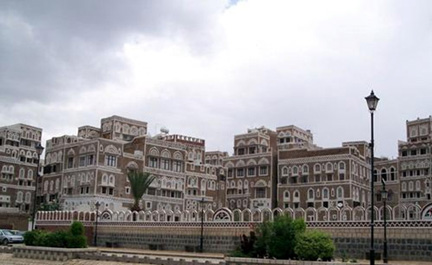
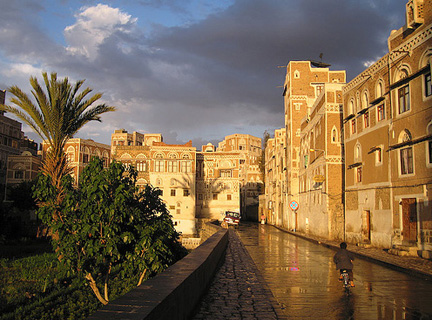
A friend sent these photographs of Sanaa, but I do not know the name of the photographer.


A friend sent these photographs of Sanaa, but I do not know the name of the photographer.
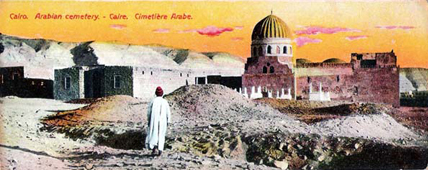
[The following is an excerpt from a recent article published by contributor el-Sayed el-Aswad, entitled “Symbolic Transformations of the Seen and the Unseen in the Egyptian Imagination” in ANTHROPOS, 105:441–453, 2010.]
The study has shown that the world is constructed by Egyptian worldview and imagination as a place of seen and unseen dimensions. These dimensions necessitate two kinds of knowledge. One is related to the knowledge of everyday observation, the other to the knowledge of hidden reality, religious or otherwise. Taken in their totality, as far as they indicate psychological, social, and spiritual realities, dreams necessitate the two kinds of knowledge. Dream visions or dreams belong to the unknown or unseen sphere and assert the effectiveness of that sphere in the reconstruction of people’s everyday reality. Dreams serve as lenses through which individuals see or glimpse the hidden or unseen aspects of the world.
Put differently, dream experiences are open to possible interpretations generating possible worlds. Dream phenomena and related notions of spirituality and unseen realities are not dealt with here within the oppositions between tradition versus modernity, common sense reality versus dream reality, or belief versus science because such oppositions do not exist in Egyptian multidimensional worldviews, visible and invisible, in which there is always intermediate realm or barzakh connecting them. Continue reading Dreams in Egypt

By Yousef Munayyer, Palestine Center, The Jerusalem Fund, February 14, 2011
Thirty years ago the Soviet Union was at the beginning of a long campaign in Afghanistan, the average person was lucky to have an advanced recording technology called a “VHS tape,†and Mohammad Hosni Mubarak took control of Egypt, the most populous nation in the Arab Middle East. This week, the last of these beginnings came to an end when millions of Egyptian protestors succeeded in toppling one of the longest standing rulers in the 5,000-year history of Egypt.
But as with all eras, Hosni Mubarak’s established norms, some national and others regional, which have now irreversibly changed. What type of government may take form in Egypt in the coming weeks and months is yet to be seen, however, it is highly unlikely that any new government can afford to repeat the mistakes of the previous regime which eliminated pluralistic political participation in the formulation of both domestic and foreign policy.
Many different global players had an investment in the outcome of the drama that finally concluded in Egypt with Mubarak’s departure. So after this transformational moment, who are the winners and who are the losers?
The Winners
1. The People of Egypt – After only 18 days, the people of Egypt succeeded in removing a ruler who had governed Egypt for three decades. But the victory for the people of Egypt is far greater than the removal of one person like Mubarak or his family. Continue reading Winners and Losers in a Post-Mubarak Arab World
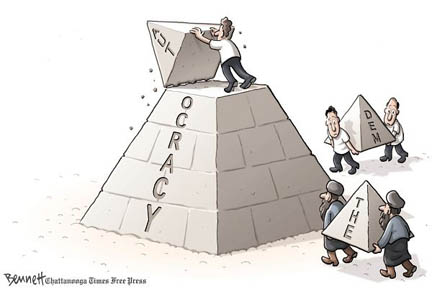
Political cartoons can be a cause for genuine laughter (not like the infamous Danish cartoon controversy). There were quite a few that appeared during the Egyptian protests, but this is my favorite.
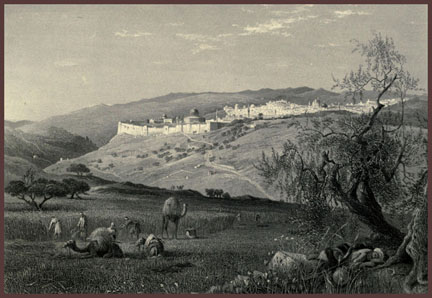
A friend recently brought my attention to an Arabic website with a fascinating collection of illustrations and photographs about Palestine under Ottoman rule. I also came across another site with illustrations of Jerusalem in the Ottoman era. I attach two examples here from the latter website, although the site does not specify the source or date of the images. Continue reading Ottoman Palestine
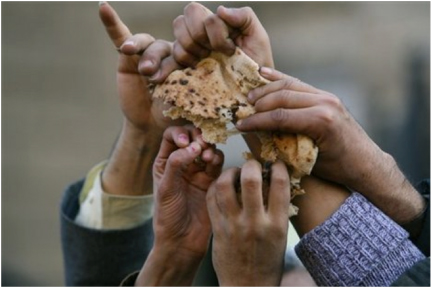
by el-Sayed el-Aswad, United Arab Emirates University
The word “Breadom†is not a spelling mistake; rather it is a combination of the words “bread†and “freedom†indicating, respectively, the “body†and “soul†of the Mother of the World (umm ad-duniya, Egypt), which is currently being affected by a novel form of revolt. In the bread uprising of January 18-19, 1977, falsely depicted by Sadat as “the uprising of thieves†(intifada haramiyya), Egyptians, especially the poor, were interested in securing the ‘bread of their livelihood’ (luqmat al-‘aysh), while in the revolt beginning on January 25th, 2011, they showed profound interest in both bread and freedom. The Arabic word “‘aysh†means both “bread†and “life or living.†These two inseparable meanings have made the phrase “‘aysh al-huriyya†(life of freedom) the best iconic gift crafted, engraved and offered, through victorious young Egyptians of victorious Cairo (al-Qahira), in the Freedom Square (Tahrir Square) opening a new chapter of Egyptian (Arab) history.
It is not surprising to hear people in Tahrir Square, directing their chanting to the government and its businessmen, shout forcefully, “thieves, thieves, thieves†(haramiyya). Also, there was a phrase written in huge letters on the ground of Tahrir Square that says “catch a thief†(imsik haramy). Such phrases resonate and reverberate in the Egyptian folk saying, “its guard is its thiefâ€, (hamiha haramiha), with reference to a plundering and deceitful governor. Continue reading Breadom
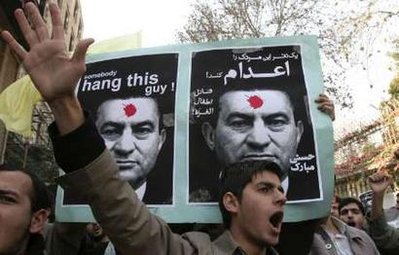
The revolution in Egypt never would have happened as fast and as ultimately peacefully as it did without the new digital age in full bloom. Now that Mubarak has resigned, the protesters are attempting to go back to life with an air of freedom conquering the stale odor of fear. Last night was one of jubilation as Egyptians of all stripes danced in the streets. The withdrawal of Mubarak was music in the ears. And, indeed, music was part of the process. Here is a hip-hop protest on Youtube with a range of video and still photographs by the Egyptian rap group known as Arabian Knightz. Other rap groups also found the recen protests worthy of Youtube. For yet another early video on the protests, click here. And here is a collage from the rapper Marcel Cartier.
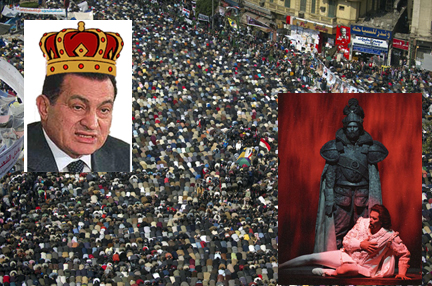
Eighteen days and no longer counting. On this day of farewell, although the wellness wished was not very strong for Hosni Mubarak among the thousands upon thousands of protesters gathered today in Tahrir Square, the Pharaoh left Thebes for good. There have been so many questions swirling in central Cairo and streaming into households worldwide that none of the thousands of pundit-pandered answers were able to satisfy. Never has a revolution been witnessed by so many people; never have so many questions been asked with so little ability to predict precisely what would happen. Will he leave? Or perhaps, more likely, when will he leave? Or, perhaps, has he already exited, stage right? Now we know, Mubarak has resigned.
Yesterday there was a brief spell of hope that Mubarak had finally accepted his fate. I attended an Egyptian event in Manhattan about as far away from the protests in Tahrir Square as can be imagined. This was a performance of Mozart arias translated into Arabic, some into Egyptian dialect. A friend arrived full of relief, having heard the earlier news that Mubarak was planning to leave. The old man’s long and self-serving speech seemed to squelch any hopes for that; the sighs and groans of the unified Egyptian spirit of protest could then be heard around the world. During intermission a long-time Egypt watcher told me that Mubarak will not leave and violence was sure to start up again. Thankfully, he was wrong. Continue reading Hosni Mubarak and Don Giovanni